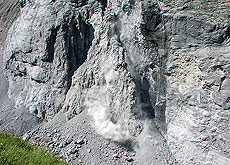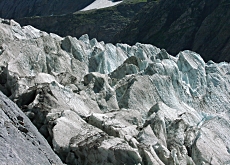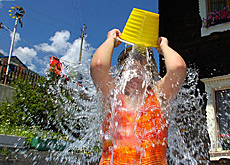Global warming good for alpine tourism

The head of tourism in the jet set resort of Gstaad says the Swiss tourist industry should do more to capitalise on rising temperatures.
Roger Seifritz is leading a working group investigating the potential benefits changing weather patterns can have for alpine destinations.
“There are always reports in the press about the negative aspects [of global warming], such as less snow in winter and landslides and flooding in summer,” Seifritz told swissinfo.
“But there are positive aspects – higher temperatures, fewer wet summers. That brings more people to the Alps.”
The Gstaad tourist director credited the hottest July on record – when temperatures regularly rose above 30 degrees – for last month’s jump in visitor numbers.
Gstaad’s cable car and lift companies sold 20 per cent more tickets than they did in the same period last year, mainly to people fleeing the heat wave at lower altitudes. And bookings in the resort’s hotels were up by at least five per cent.
He said similar increases were recorded in the hot and dry summer of 2003. Writing in a recent issue of the Swiss magazine, Hotel + Tourism Revue, Seifritz called climate change and its impact on the tourist industry “a hot issue”.
He and several other tourist directors from the Bernese Oberland are currently working with Bern University to analyse future scenarios.
Impact
The study, partially funded by canton Bern, is looking at the potential impact of global warming on local alpine resorts over the next 20 years. The first results will be published in September.
Seifritz told swissinfo the aim is to define chances and risks. “Based on the study, we will try to develop strategies together with our partners, such as the lift companies, hotel associations and local councils.”
It is too early, according to Gstaad’s tourist director, to use global warming in any campaigns to promote tourism. But he said if forecasts are correct and summer temperatures in the Alps rise by about four degrees, then “we will certainly play with this advantage.”
He reckons it will help even the score with southern destinations that threaten to become too hot for holidaymakers. “They profit from our loss in winter when more and more people go to the Canary Islands or the Caribbean because there is less snow in the Alps.”
Instability
Thomas Bieger, head of the Institute for Public Services and Tourism at St Gallen University, sees nothing morally wrong with mountain resorts trying to “take advantage of the situation”.
He told swissinfo they have little choice but to find another way to generate income since warmer winters means the ski season will be less attractive and therefore less profitable. “In order to ensure good ski conditions, they will have to make major investments, for instance, in snowmaking infrastructure.”
But he warns: “Climate change is not just about rising temperatures but instable weather as well. We had a wonderfully hot July followed by a cold August. It’s becoming more difficult to predict the weather.”
The big winners, Bieger says, could be cities where tourists can enjoy cultural attractions without worrying about floods or rockslides.
This is a reason why he thinks the demand for desert destinations like Dubai will continue to grow. “The weather there is stable, and if people are going to travel that far, they want to be sure they will see the sun.”
But he adds that this is self-defeating. The increase in long haul flights to meet the demand means more harmful emissions released into the atmosphere, and more people straining already limited water supplies.
“It’s a vicious cycle. The more energy the tourist industry requires, the greater the disadvantage for the climate.”
swissinfo, Dale Bechtel
According to the 2001 Climate Change report of the Intergovernmental Panel on Climate Change, increases in temperatures since the start of the 20th century have not occurred for such a duration or magnitude over the previous 1,000 years.
Worldwide temperatures have risen by about 0.6 degrees Celsius on average. Over the past 30 years, the temperature increase amounted to 0.1-0.2 degrees a decade as a global average.
In Switzerland the average temperature has risen by almost 2 degrees since 1970.
Climate experts are forecasting summer temperatures in the Alps to rise between 3 and 5 degrees in the next few decades.
If the predictions are right, the Alps are expected to lose about 80% of their glacier cover.

In compliance with the JTI standards
More: SWI swissinfo.ch certified by the Journalism Trust Initiative













You can find an overview of ongoing debates with our journalists here . Please join us!
If you want to start a conversation about a topic raised in this article or want to report factual errors, email us at english@swissinfo.ch.